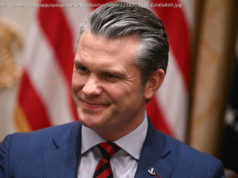Inside the spin to turn the former FBI director’s testimony into a GOP win.
It was almost the end of James Comey’s nearly three-hour public testimony, when Sen. John Cornyn trapped him into saying a Republican talking point. “If you’re trying to make an investigation go away, is firing an FBI director a good way to make that happen?” Cornyn asked Comey, who Trump had fired in May. “It doesn’t make a lot of sense to me, but I’m hopelessly biased given the one that I was fired, ” Comey responded, adding, “the work’s going to go on as before.” In answering, Comey, who spoke highly of the FBI and its ability to conduct a thorough and independent investigation without him, said exactly what Republicans wanted to hear: The firing did not obstruct justice. The exchange illustrated just one of the many ways Republicans are trying to spin the narrative Comey laid out before the committee — a seething account of a tense personal relationship with Trump and the White House, in which Comey called out the president’s propensity for lies and recounted Trump repeatedly asking him for his “honest loyalty” and to “lift the cloud” of the investigations from his administration. But from the Republican perspective, the takeaways from Comey’s testimony see Trump as the winner. “Was this overall a better day for the president than for those who want to impeach him? By far, much better for the president than for those that seek to impeach him, ” Rep. Mark Meadows (R-NC) said. To Meadows, and many others in the party, the president was “vindicated, ” Comey’s firing did not directly impede any investigations into Trump’s team, and he gave no evidence of collusion between Trump and the Russians. After weeks of downplaying the allegations leaked in the press in anticipation of first-hand evidence, initial reactions to Comey’s testimony showed it didn’ t really matter where the reports were coming from. Republicans don’ t seem to think there is enough evidence for concern, or at least it’s not worth breaking ranks with the president over. Thursday’s testimony turned into a test, and Republicans pledged their “honest loyalty” to Trump — without the president having to ask for it. Republicans, by and large, stuck to a script that mostly resembles a list of talking points distributed by the Republican National Committee and White House, as: Take Rep. Jim Jordan, the conservative from Ohio who sits on the House Oversight Committee, which is currently conducting its own investigation into the obstruction of justice allegations, whose takeaways from Comey’s testimony were in line with the party’s. Jordan thought the written testimony indicated the president was “right” in that he wasn’ t under investigation, and showed there was no claim of obstruction of justice. Indeed, Comey said he would stop short of saying “obstruction of justice” exactly, explaining that is something for special counsel Robert Mueller to determine now. Then Jordan pointed to Comey’s memo-keeping habits — particularly because they seemed to only be inspired by his interactions with Trump — with some skepticism. To him, it appeared that Comey was doing something unusual here, not Trump. During the public testimony, Donald Trump Jr. also chimed in, tweeting throughout the hearing that Comey was out for Trump, and “more than willing to leak something against [Trump] but not something that exonerates him.” Some congressional Republicans have also leaned into skepticism about Comey’s possible political intents. Sen. Steve King (R-IA) told Vox’s Jeff Stein that “there’s a stronger piece that James Comey orchestrated this hearing after he was fired, ” emphasizing that Comey himself “leaked” his memos. King proceeded to question whether or not Trump actually cleared the Oval Office to talk to Comey — as Comey testified today, suggesting that it could be a false post-characterization of a normal interaction. “This borders on the ridiculous, ” King said on the details Comey recalled of his interactions with the president. Meadows, too, raised eyebrows over the one-sided nature of Comey’s testimony, pointing out that Comey’s memos could have been self-serving. “I believe that there was nothing untruthful about his testimony, but that being said, to make comments about perceptions in sworn testimony doesn’ t necessarily make it true, ” Meadows said. “I think Comey wrote things down in a way that perhaps would have a narrative that reflects pretty good on him.” Comey should have pushed back against Trump if he felt he was overstepping his role, Meadows argued. He didn’ t think there was a need for Trump to testify, however. Attempts to defend the president put Republicans in difficult positions, and oddly often led to explanations that painted Trump as inexperienced and without foresight. “I don’t think [Trump] colluded with the Russians because he doesn’t collude with his own staff, ” Sen. Lindsey Graham (R-SC) told Washington Examiner’s Susan Ferrechio earlier this week in anticipation of Comey’s testimony, attributing the alleged misconduct to the White House’s disorder. It’s no secret among veteran Republican lawmakers that Trump has had a steep learning curve, and conversations with multiple Republican aides all insinuated the same reality Graham laid out — that Trump is too out of the loop to be nefarious. Even Speaker Paul Ryan, who has on several occasions stressed the importance of an independent and professional line of communication between the White House and the FBI, essentially made the argument that Trump’s misconduct with Comey was because. “The president is new at this, ” Ryan said as an “observation” of Trump’s private conversations with Comey. “He is new to government so he probably wasn’ t steeped into the long running protocols… established between the DOJ, FBI, and White House.” Ryan proceeded to defend Trump’s frustration with the investigations, saying Comey’s testimony clarified why the president has been so upset with the looming scandals. “What I got out of that testimony is that we now know why he was so frustrated, because Comey told him three times there was no investigation of him, yet that speculation was allowed to continue, ” Ryan said. “So obviously we know why he was so frustrated.” Meadows, who also sits on the House Oversight Committee, made a similar point, that Trump perhaps should have been more thoughtful in the implication and optics of his actions. “I don’ t see a smoking gun. I see some things that I wish weren’ t said, to be frank, ” Meadows said. At the end of the day, the frustration with the scandals is not directed at the president’s actions or criminal allegations: It is over the fact that they have to Trump’s desk.






